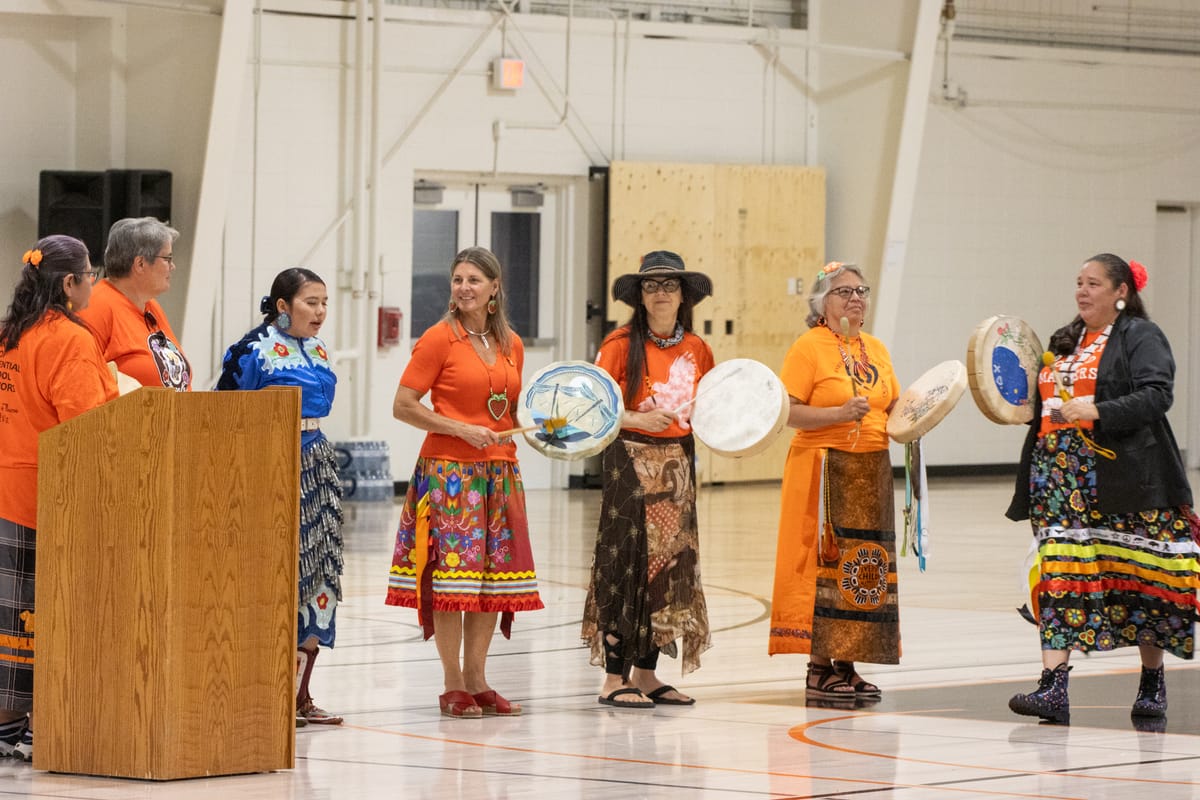September is Truth And Reconciliation Month: An Interview with Co-Founder of Grandmother’s Voice, Jody Harbour
By Rebecca Liu ’25, Head Editor-in-Chief; Edited by Rawnie Sun ’25, Head Editor-in-Chief

Can you tell me a little bit about yourself and what inspired you to help found Grandmother's Voice?
Okay, so a little bit about myself. I’ve been married for 30 years and have two kids — a 23-year-old son and a 13-year-old daughter. I’ve been an entrepreneur for most of my life, starting when I was around 19. I’ve had a range of careers, from being a hairstylist to a salesperson, and right now, I sell workwear. I even invented a bra alternative and went on Dragon’s Den twice with it! But through all of that, I’ve always followed my heart. It’s always been about becoming a better version of myself, helping my community, and using my voice when there’s a need. I’m someone who steps up. I’ve volunteered throughout my life, including at the Cancer Centre in Halton when my mother-in-law was sick. I’ve always been a person who tries to live with purpose and make a difference, whether big or small.
Tell me more specifically about your organization Grandmother’s Voice. Describe your mission, your accomplishments, and your goals for the future and just generally introduce it to people who aren’t familiar.
This topic is very deep and spiritual for me, which is something I never expected, especially considering my background. I’m a retired hairstylist, and now I sell workwear for a living. My husband and I still run our company. But once I uncovered the truth about what happened to my family and how it connects to the history of our country and the world, it changed everything for me.
You know, it’s one thing to say, “Oh, my dad died of alcoholism,” and that his mother, grandmother, and others before them were troubled. But then you realize that this wasn’t just coincidence. There was a plan — to plague, destroy, rape, pillage, and separate our families. This realization took me to a whole new level of understanding. I started thinking: if this happened to me, a person who’s worked hard to educate herself and create a good life, what about those who didn’t get out, who haven’t been able to understand their truth or the history that brought them here?
When I learned about Truth and Reconciliation, it became clear that it’s more than just an acknowledgment of what happened. But what comes next? When do we truly begin to heal? When do we start offering real resources for Indigenous people to heal, and not in the ways the Western world thinks we should, but in ways rooted in our values and culture? Western institutions — education and healthcare — have evolved without really understanding Indigenous values or how they contribute to healing.
I started questioning what reconciliation means. We borrowed the concept from other countries that went through similar atrocities, but does it resonate here? How do we, as a nation, explain this to everyday people, including newcomers who may not grasp the full truth? Things are moving so fast that it’s hard to keep up.
What does Truth and Reconciliation mean to you personally and in the context of your organization's mission? Why is it so important?
Reconciliation is supposed to be about understanding, about commemorating. But even that feels performative sometimes. For instance, government officials get the day off, but what does that do? For those who understand the depth of the issue, it’s still a day of mourning, a recognition that the wound is fresh for the original people of this land.
And I think it’s critical that non-Indigenous people stop controlling how this healing should happen. It’s been almost 10 years since the Calls to Action came out, but it feels like we’re still in the same place. There’s so much more to reconciliation and it means something different to everyone.
I want to share information on my organization Grandmother’s Voice. It’s all about sharing knowledge and supporting other Indigenous people, especially those who are reconnecting with their culture. One project I love is called "101 Drums." It’s led by Indigenous elders in St. Catharines, and it’s about sending 101 drums across Canada for artists to paint their vision of what a healed Canada would look like. It’s part of Grandmother's Voice’s mission to help people heal through reconciliation.
What are some of the biggest challenges your organization has faced when advocating for Indigenous rights and amplifying ancestral wisdom?
For the biggest challenges we face in advocating for Indigenous rights and amplifying ancestral wisdom, it’s complicated. One challenge is the energy that comes with amplifying our voices — when we get louder, other forces show up too. There’s a lot of lateral violence in our communities, which I think is partly due to the way funding is distributed. Non-Indigenous organizations often receive funding meant for reconciliation, and they then hire Indigenous people to work under them. This creates an unseen competition.
There’s already so much division in our communities, largely due to the historical trauma of colonization, where families and communities were separated. This has bred competition, jealousy, and a kind of internal conflict that’s hard to shake. Younger generations, like yours, seem more open to supporting and uplifting each other, thanks to growing up with social media and a sense of connectedness. But older generations, raised in the era of "divide and conquer," still carry those wounds.
Another challenge is that non-Indigenous organizations are often given the responsibility to educate the public about Indigenous issues, even though they don’t fully understand them. Indigenous matters are sometimes lumped under the umbrella of “equity, diversity, and inclusion,” which can dilute their significance. Many people don’t understand that Indigenous communities don’t have full control over their own resources — the government and non-Indigenous people do. This just perpetuates the same colonial structures that have been in place for centuries.
It’s deep stuff, but it’s the reality. I could go on, but I don’t want to overwhelm you. I’m sure you’ll be able to find what resonates with you.
In what ways do you believe non-Indigenous communities can better support the Truth and Reconciliation process?
As for how non-Indigenous communities can better support us without overstepping, it’s about staying engaged in the conversation beyond just one day. It’s not about performative gestures; it’s about truly listening and learning. If you’re passionate about something, whether it’s art, music, or anything else, follow Indigenous voices and support their work. Stay connected and committed.



